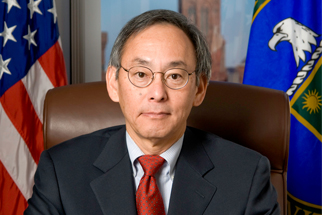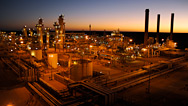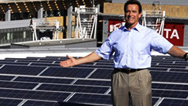A Clean Energy Future?
- By David Levin
- Posted 04.19.11
- NOVA
Steven Chu is the U.S. Secretary of Energy under President Obama and a Nobel Prize-winning physicist. He's also a big proponent of renewable power, like wind and solar. Chu says that although they're essential to fight climate change, that's only one reason we should adopt them in the United States. Another reason is purely economic—there's a lot of money to be made in the clean energy market.
 Listen
Listen
Developing clean energy technologies makes sense not only environmentally but economically, Nobelist Steven Chu argues.
Transcript
A Clean Energy Future?
Posted: April 19, 2011
DAVID LEVIN: You're listening to a NOVA podcast. I'm David Levin.
STEVEN CHU: Mexico is beginning to move on this. India is beginning to move on this, Western Europe is beginning to move on this. Even some oil exporting countries, OPEC countries, are beginning to realize that you need to develop cleaner energy sources.
DAVID LEVIN: Steven Chu is the U.S. Secretary of Energy under President Obama. He's a Nobel Prize-winning physicist, and a big proponent of renewable power, like wind and solar. He says they're essential to fight climate change. But that's only one reason he thinks we should adopt them in the U.S. Another reason is purely economic. There's a lot of money to be made in renewable energy. He thinks that's an angle most Americans can appreciate, regardless of how they feel about the risks of global warming.
STEVEN CHU: You don't even have to believe in those risks. All you have to do is believe a few things. One thing you need to believe in is that the price of oil in the coming decades will be higher, in high probability. No one can predict what the price of oil will be a week, a month, a year from today. But 10, 20 years from today, I think you can bank on it that it will be higher.
DAVID LEVIN: That means we'll need to start developing more renewable energy in the U.S. right now.
STEVEN CHU: Science has to deliver. We have to transform the way we use energy so it is much more efficient. We have to grow renewables. After all, if you look at the amount of energy, of sunlight energy, hitting the Earth, it's enormous. And if you can capture a just a small fraction of that, one ten-thousandth of that, it would be enough to power the world. So you need technologies to develop solar power, wind power, energy storage. And as the price of fossil fuel climbs, there is a prospect with these new technologies that you can actually make energy affordable.
DAVID LEVIN: Getting to that point will still take years, maybe decades. But if the U.S. is going to be a major player in the clean energy market worldwide, we'll have to start putting more efforts into green technology, and eventually, we'll need to phase out fossil fuels. That won't be cheap.
STEVEN CHU: The energy business, just the raw amount we spend on energy in the form of fuels, for example, is over a trillion dollars in the United States. If you then fold in all of the things that produce the energy, use the energy, things of that nature, deeply involved in that, it is a multi-trillion-dollar business. So you actually have to begin to say, if you are going to go to a sustainable energy future, ultimately, you are going to have to replace many of those industries over a period of decades. But that is a considerable capital investment.
DAVID LEVIN: The government, Chu says, shouldn't bear the full cost of this transition. Instead, he thinks it should help fund research to bring the price of clean energy within reach of most Americans. When it's cheap enough, private markets will take over. He says the Department of Energy is working to make that a reality for things like solar power.
STEVEN CHU: If you decrease the cost by a factor of 4, we're pretty confident solar will blossom everywhere, or just about everywhere there's reasonable sunlight. And so, then we say, "What do you need to do to get that going?" It's going to be research in a laboratory, it will be manufacturing prowess, it's going to be all of those things. And what we want to do in Department of Energy is to see what value can we add to U.S. industries and development to accelerate the progress in the United States.
DAVID LEVIN: Chu thinks that getting the U.S. to that point is really just a matter of mindset. The global demand for green energy is only going up in the future. And if we play our cards right, he says it could create job opportunities and new areas for innovation here in the States.
STEVEN CHU: You need to convince not only the American public, but industries, of the incredible opportunity we have. Why do I say opportunity? Because this is where we're heading. This is where the future will be. That the world will demand clean energy sources, the world will demand higher efficiency automobiles, higher efficiency buildings. Who is going to supply them with that? it requires invention. It requires technology development. We still have the best research universities, we have an incredible national lab system, we have very, very brilliant entrepreneurs and businesses. So if we are the best in the world at this, why not rise to the challenge and supply the world with the things it will need?
Credits
Audio
- Produced by
- David Levin
- Original interview by
- Doug Hamilton
Image
- (Steven Chu)
- Courtesy U.S. Department of Energy
Related Links
-

Power Surge
Are we finally on the brink of a clean energy revolution?
-

Hear From Steven Chu
In these audio clips, Steven Chu talks about energy policy, climate change, the risks of lobbyists, and more.
-

Secretary of Energy Steven Chu
The Energy Secretary in the Obama administration offers his take on California's policies and the nation's options.
-

The Big Energy Gamble
Can California's ambitious plan to cut greenhouse gases actually succeed?
You need the Flash Player plug-in to view this content.

